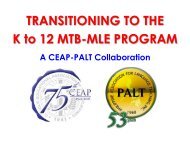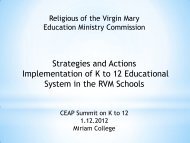Does Catholic mission and identity have enduring outcomes on their ...
Does Catholic mission and identity have enduring outcomes on their ...
Does Catholic mission and identity have enduring outcomes on their ...
You also want an ePaper? Increase the reach of your titles
YUMPU automatically turns print PDFs into web optimized ePapers that Google loves.
<str<strong>on</strong>g>Does</str<strong>on</strong>g> <str<strong>on</strong>g>Catholic</str<strong>on</strong>g> <str<strong>on</strong>g>missi<strong>on</strong></str<strong>on</strong>g> <str<strong>on</strong>g>and</str<strong>on</strong>g> <str<strong>on</strong>g>identity</str<strong>on</strong>g> <str<strong>on</strong>g>have</str<strong>on</strong>g><br />
<str<strong>on</strong>g>enduring</str<strong>on</strong>g> <str<strong>on</strong>g>outcomes</str<strong>on</strong>g> <strong>on</strong> <strong>their</strong> graduates?<br />
An empirical study of the hallmarks<br />
of <str<strong>on</strong>g>Catholic</str<strong>on</strong>g> higher educati<strong>on</strong><br />
Professor Dr Angelina L.V. Gutiérrez<br />
St. Scholastica’s College - Manila<br />
CEAP Nati<strong>on</strong>al C<strong>on</strong>venti<strong>on</strong> 2012<br />
Sessi<strong>on</strong> I: <str<strong>on</strong>g>Catholic</str<strong>on</strong>g> Missi<strong>on</strong> & Identity<br />
Manila, August 30, 2012
C<strong>on</strong>text & Purpose of the Research<br />
effects of <str<strong>on</strong>g>Catholic</str<strong>on</strong>g> <str<strong>on</strong>g>missi<strong>on</strong></str<strong>on</strong>g> & <str<strong>on</strong>g>identity</str<strong>on</strong>g><br />
limited scholarly studies <strong>on</strong> <str<strong>on</strong>g>Catholic</str<strong>on</strong>g><br />
higher educati<strong>on</strong><br />
culture of corrupti<strong>on</strong> vis-à-vis <str<strong>on</strong>g>Catholic</str<strong>on</strong>g><br />
educati<strong>on</strong>?<br />
research purpose: assess <str<strong>on</strong>g>Catholic</str<strong>on</strong>g><br />
educati<strong>on</strong> <str<strong>on</strong>g>outcomes</str<strong>on</strong>g> through alumni’s<br />
percepti<strong>on</strong>
Research Questi<strong>on</strong>s<br />
1. What are the lasting <str<strong>on</strong>g>outcomes</str<strong>on</strong>g> of <str<strong>on</strong>g>Catholic</str<strong>on</strong>g><br />
<str<strong>on</strong>g>missi<strong>on</strong></str<strong>on</strong>g> & <str<strong>on</strong>g>identity</str<strong>on</strong>g> as perceived by its<br />
alumni?<br />
2. If <str<strong>on</strong>g>Catholic</str<strong>on</strong>g> educati<strong>on</strong> is a prime source of<br />
intellectual, moral & spiritual formati<strong>on</strong> of<br />
the nati<strong>on</strong>’s leaders, why is there pervasive<br />
corrupti<strong>on</strong> in the Philippines?<br />
How do graduates of <str<strong>on</strong>g>Catholic</str<strong>on</strong>g> educati<strong>on</strong><br />
c<strong>on</strong>fr<strong>on</strong>t this culture of corrupti<strong>on</strong>??<br />
3. What are the implicati<strong>on</strong>s of this study for the<br />
scholarship, policy & practice of <str<strong>on</strong>g>Catholic</str<strong>on</strong>g><br />
educati<strong>on</strong>?
Research Methodology<br />
Purposive Sampling of 200<br />
alumni (100 female & 100<br />
male) from 35 <str<strong>on</strong>g>Catholic</str<strong>on</strong>g><br />
colleges/universities<br />
Empirical investigati<strong>on</strong>:<br />
mixed method<br />
Quantitative & Qualitative<br />
data analysis<br />
Research instrument:<br />
Hallmarks of <str<strong>on</strong>g>Catholic</str<strong>on</strong>g><br />
Higher Educati<strong>on</strong><br />
Inventory (HCHEI)
Profile of the 200 resp<strong>on</strong>dents<br />
Religi<strong>on</strong>: 95% <str<strong>on</strong>g>Catholic</str<strong>on</strong>g>s;<br />
5% n<strong>on</strong>-<str<strong>on</strong>g>Catholic</str<strong>on</strong>g>s & n<strong>on</strong>-Christians<br />
8 -20 years of study in <str<strong>on</strong>g>Catholic</str<strong>on</strong>g> institutes<br />
Graduated from <str<strong>on</strong>g>Catholic</str<strong>on</strong>g> higher educati<strong>on</strong> between<br />
1971-2012 (entered college between 1965 – 2005)<br />
Ages 21 – 59 years old, born between 1950s – 1990s<br />
96% science degrees & 4% humanities degrees<br />
65.5% employed/self-employed; 17% government<br />
employees; 7% educators; 4% in grad school;<br />
6.5% unemployed/new graduates
Theoretical framework & research variables<br />
Blessed John Paul II Ex corde ecclesiae<br />
or On <str<strong>on</strong>g>Catholic</str<strong>on</strong>g> University (1990)<br />
Pope Benedict XVI<br />
Byrk (1993) <str<strong>on</strong>g>and</str<strong>on</strong>g> Nichols (2009)<br />
<str<strong>on</strong>g>identity</str<strong>on</strong>g> <str<strong>on</strong>g>missi<strong>on</strong></str<strong>on</strong>g><br />
comm<strong>on</strong><br />
good<br />
assessment<br />
of good<br />
practices
Paradigm of the study<br />
influence<br />
comm<strong>on</strong> good<br />
vis-à-vis<br />
corrupti<strong>on</strong><br />
hallmarks of <str<strong>on</strong>g>Catholic</str<strong>on</strong>g><br />
educati<strong>on</strong> based <strong>on</strong><br />
<str<strong>on</strong>g>identity</str<strong>on</strong>g> & <str<strong>on</strong>g>missi<strong>on</strong></str<strong>on</strong>g><br />
<str<strong>on</strong>g>outcomes</str<strong>on</strong>g><br />
&<br />
engagement<br />
trans<str<strong>on</strong>g>missi<strong>on</strong></str<strong>on</strong>g> of<br />
<str<strong>on</strong>g>Catholic</str<strong>on</strong>g> culture<br />
& traditi<strong>on</strong><br />
alumni
Findings of the Study : RQ1<br />
Four Hallmarks of <str<strong>on</strong>g>Catholic</str<strong>on</strong>g> HEI Mean Interp<br />
Professi<strong>on</strong>al competence 4.4 agree<br />
Faith development & religious<br />
formati<strong>on</strong><br />
4.3 agree<br />
Social & civic resp<strong>on</strong>sibility 4.3 agree<br />
Moral & character formati<strong>on</strong> 4.2 agree<br />
Total mean<br />
4.3<br />
agree<br />
(positive<br />
influence)
Negative resp<strong>on</strong>ses<br />
34.5% agreed…<br />
‘morality is relative’<br />
31% str<strong>on</strong>gly agreed…<br />
‘courses did not address<br />
corrupti<strong>on</strong>’<br />
15% undecided…<br />
‘spiritual activities in<br />
school influence <strong>their</strong><br />
church attendance today’<br />
11.5% undecided…<br />
‘teamwork or solve<br />
problems collaboratively’<br />
34.50% 31%<br />
15% 11.50%
Positive results of <str<strong>on</strong>g>Catholic</str<strong>on</strong>g> educati<strong>on</strong><br />
Faith & spiritual<br />
formati<strong>on</strong><br />
‘informed faith’<br />
‘practicing <str<strong>on</strong>g>Catholic</str<strong>on</strong>g><br />
& resp<strong>on</strong>sible<br />
parent’<br />
‘serve in the parish’<br />
Moral formati<strong>on</strong><br />
‘wisdom & courage’<br />
‘guide in teaching<br />
children’<br />
‘values of h<strong>on</strong>esty,<br />
integrity…’
Social resp<strong>on</strong>sibility<br />
‘social awareness<br />
& compassi<strong>on</strong> to<br />
the poor’<br />
‘decide for the<br />
comm<strong>on</strong> good’<br />
‘social justice &<br />
help improve the<br />
world’<br />
Holistic educati<strong>on</strong><br />
‘well-rounded’<br />
‘professi<strong>on</strong>al<br />
success’<br />
‘value-added<br />
benefits’<br />
54% unanimous <strong>on</strong><br />
the benefits of<br />
<str<strong>on</strong>g>Catholic</str<strong>on</strong>g> educati<strong>on</strong>
Weak spots of <str<strong>on</strong>g>Catholic</str<strong>on</strong>g> educati<strong>on</strong><br />
threat of secularism:<br />
‘outdated ethical principles’…‘closed-minded’<br />
commercializati<strong>on</strong>:<br />
‘costly educati<strong>on</strong>’… ‘frequent d<strong>on</strong>ati<strong>on</strong>s’<br />
defective setting:<br />
‘strict regulati<strong>on</strong>s & rebelli<strong>on</strong>’...<br />
‘overprotecti<strong>on</strong>’… ‘adjustment difficulties’<br />
drawbacks to pers<strong>on</strong>al integrati<strong>on</strong><br />
‘others took advantage’…‘inflexible’…<br />
‘unrealistic’
Rating the hallmarks of <str<strong>on</strong>g>Catholic</str<strong>on</strong>g> educati<strong>on</strong><br />
14%<br />
36%<br />
6%<br />
Percentage of resp<strong>on</strong>dents<br />
44%<br />
moral & character<br />
formati<strong>on</strong> 44%<br />
faith & religious<br />
formati<strong>on</strong> 36%<br />
professi<strong>on</strong>al<br />
competence 14%<br />
social & civic<br />
resp<strong>on</strong>sibility 6%
RQ 2<br />
Corrupti<strong>on</strong> vis-à-vis <str<strong>on</strong>g>Catholic</str<strong>on</strong>g> educati<strong>on</strong><br />
Philippines is 141 st corrupt where 180 th is<br />
most corrupt nati<strong>on</strong> (Transparency Intl.,<br />
2009)<br />
4.0 percepti<strong>on</strong> of corrupti<strong>on</strong>: public<br />
officials, civil servants, political parties<br />
‘Corrupti<strong>on</strong> as cancer of the nati<strong>on</strong>’<br />
(Rosales, 2008)
Why corrupti<strong>on</strong> despite <str<strong>on</strong>g>Catholic</str<strong>on</strong>g><br />
educati<strong>on</strong>?<br />
bureaucracy not <str<strong>on</strong>g>Catholic</str<strong>on</strong>g> educati<strong>on</strong> :<br />
‘human free will’… ‘<str<strong>on</strong>g>Catholic</str<strong>on</strong>g> educati<strong>on</strong><br />
help us m<strong>on</strong>itor corrupti<strong>on</strong>’<br />
Problem of instituti<strong>on</strong>alized<br />
corrupti<strong>on</strong>: ‘culture & bureaucracy’<br />
Human development issues: ‘poverty<br />
& bribery’… ‘ political dynasty’
What alumni can do to c<strong>on</strong>fr<strong>on</strong>t corrupti<strong>on</strong>?<br />
start change in <strong>on</strong>eself: ‘be good examples’<br />
moral formati<strong>on</strong>: ‘h<strong>on</strong>esty‘… ‘be law-<br />
abiding citizens'<br />
acti<strong>on</strong> & advocacy against corrupti<strong>on</strong>: ‘take<br />
part in anti-corrupti<strong>on</strong> programs’… ‘ vote<br />
wisely’… ‘ be involved in community projects<br />
to help the poor’<br />
religious & values educati<strong>on</strong>: ‘reinforce<br />
values’… ‘educate public leaders to be God-<br />
fearing’
Need to renew the tasks & <str<strong>on</strong>g>missi<strong>on</strong></str<strong>on</strong>g><br />
of <str<strong>on</strong>g>Catholic</str<strong>on</strong>g> educati<strong>on</strong>: ‘topic <strong>on</strong> corrupti<strong>on</strong><br />
not discussed in class’…‘politics & corrupti<strong>on</strong><br />
in the Church & <str<strong>on</strong>g>Catholic</str<strong>on</strong>g> institutes’<br />
‘A <str<strong>on</strong>g>Catholic</str<strong>on</strong>g> institute must <str<strong>on</strong>g>have</str<strong>on</strong>g> the courage<br />
to speak uncomfortable truths<br />
which do no please public opini<strong>on</strong>,<br />
but which are necessary to safeguard<br />
the authentic good of society’<br />
(JPII Ex corde ecclesiae, 1990).
RQ 3<br />
Inquiry <strong>on</strong> the scholarship, policy <str<strong>on</strong>g>and</str<strong>on</strong>g><br />
practice of <str<strong>on</strong>g>Catholic</str<strong>on</strong>g> educati<strong>on</strong><br />
research <strong>on</strong> the role, <str<strong>on</strong>g>missi<strong>on</strong></str<strong>on</strong>g> & <str<strong>on</strong>g>identity</str<strong>on</strong>g><br />
of <str<strong>on</strong>g>Catholic</str<strong>on</strong>g> educati<strong>on</strong>al institutes<br />
influence of research <strong>on</strong> policy &<br />
practice<br />
shared resp<strong>on</strong>sibility in transmitting<br />
the legacy of <str<strong>on</strong>g>Catholic</str<strong>on</strong>g> educati<strong>on</strong>
“Set against pers<strong>on</strong>al struggles,<br />
moral c<strong>on</strong>fusi<strong>on</strong> &<br />
fragmentati<strong>on</strong> of knowledge,<br />
the noble goals of scholarship & educati<strong>on</strong>,<br />
founded <strong>on</strong> the unity of truth<br />
in service of the pers<strong>on</strong> & the community,<br />
becomes an especially powerful<br />
instrument of hope”<br />
(Pope Benedict XVI, 2008)
C<strong>on</strong>cluding thoughts<br />
<str<strong>on</strong>g>Catholic</str<strong>on</strong>g> educators & alumni are part of a<br />
noble traditi<strong>on</strong><br />
inspirati<strong>on</strong><br />
celebrate in writing, further research<br />
& discussi<strong>on</strong> the <str<strong>on</strong>g>enduring</str<strong>on</strong>g><br />
c<strong>on</strong>sequences of <str<strong>on</strong>g>Catholic</str<strong>on</strong>g> educati<strong>on</strong>
Year of Faith & the New Evangelizati<strong>on</strong><br />
<str<strong>on</strong>g>Catholic</str<strong>on</strong>g> <str<strong>on</strong>g>identity</str<strong>on</strong>g> & <str<strong>on</strong>g>missi<strong>on</strong></str<strong>on</strong>g> as compass<br />
in our research, acti<strong>on</strong>s & prayers<br />
“commitment to the new<br />
evangelizati<strong>on</strong> so we may together<br />
rediscover the joy of believing<br />
<str<strong>on</strong>g>and</str<strong>on</strong>g> the enthusiasm for<br />
communicating the faith”<br />
(Pope Benedict XVI Porta Fidei, 2011)
<str<strong>on</strong>g>Does</str<strong>on</strong>g> <str<strong>on</strong>g>Catholic</str<strong>on</strong>g> <str<strong>on</strong>g>missi<strong>on</strong></str<strong>on</strong>g> <str<strong>on</strong>g>and</str<strong>on</strong>g> <str<strong>on</strong>g>identity</str<strong>on</strong>g><br />
<str<strong>on</strong>g>have</str<strong>on</strong>g> <str<strong>on</strong>g>enduring</str<strong>on</strong>g> <str<strong>on</strong>g>outcomes</str<strong>on</strong>g> <strong>on</strong> <strong>their</strong><br />
graduates? An empirical study <strong>on</strong><br />
the hallmarks of <str<strong>on</strong>g>Catholic</str<strong>on</strong>g> educati<strong>on</strong><br />
Professor Dr Angelina Gutiérrez<br />
St. Scholastica’s College-Manila<br />
( based <strong>on</strong> the article ‘<str<strong>on</strong>g>Does</str<strong>on</strong>g> a <str<strong>on</strong>g>Catholic</str<strong>on</strong>g><br />
educati<strong>on</strong> <str<strong>on</strong>g>have</str<strong>on</strong>g> lasting effects <strong>on</strong> adult<br />
life?’ published in the Internati<strong>on</strong>al<br />
Studies in <str<strong>on</strong>g>Catholic</str<strong>on</strong>g> Educati<strong>on</strong> journal,<br />
Vol. 4. No.1, pp. 16-34, 2012, by<br />
Routledge/Taylor & Francis, Engl<str<strong>on</strong>g>and</str<strong>on</strong>g>)<br />
Internati<strong>on</strong>al Studies in <str<strong>on</strong>g>Catholic</str<strong>on</strong>g><br />
Educati<strong>on</strong> (ISCE)<br />
(www.t<str<strong>on</strong>g>and</str<strong>on</strong>g>f.co.uk/journals/rice)


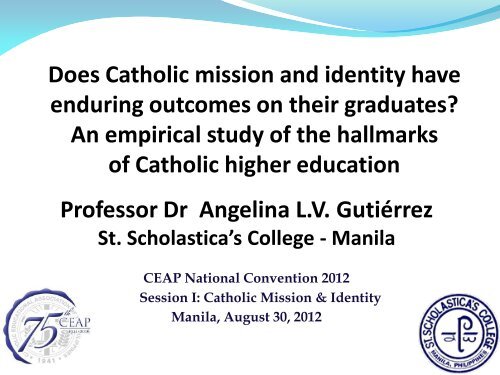

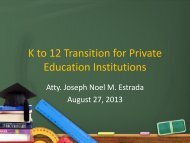
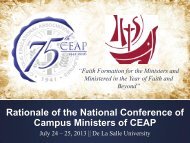
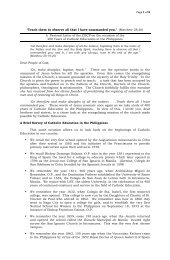

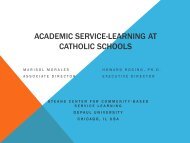
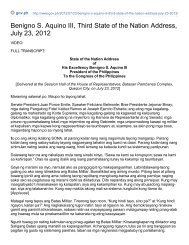
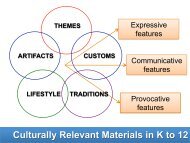
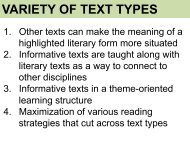
![Harmony Prayer (Silsilah Dialogue Movement) [Compatibility Mode]](https://img.yumpu.com/17302648/1/190x135/harmony-prayer-silsilah-dialogue-movement-compatibility-mode.jpg?quality=85)
